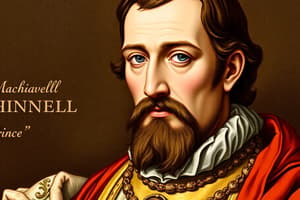Podcast
Questions and Answers
What is Machiavelli's view on human nature? Do you agree with him?
What is Machiavelli's view on human nature? Do you agree with him?
Machiavelli believed that humans are inherently selfish and only act in their own best interests. He argues that rulers must assume everyone will act this way, and be prepared to use force if necessary to keep power.
According to Machiavelli, what should the main goal of a ruler be?
According to Machiavelli, what should the main goal of a ruler be?
Machiavelli argued that the primary focus of a ruler should be to instill fear in the population to ensure stability.
According to Machiavelli, fear is more effective than love as a method of control. Why?
According to Machiavelli, fear is more effective than love as a method of control. Why?
- Love can easily turn to resentment, while fear is a constant reminder of the consequences of disobedience. (correct)
- All of these answers are correct. (correct)
- Fear is a more secure way to maintain power as people are less likely to challenge the ruler's authority. (correct)
- Love is a weaker motivator, as people will often betray the ruler if it is in their best interests. Fear is a stronger motivator than love in this regard. (correct)
What is the social contract theory? Do you agree with it?
What is the social contract theory? Do you agree with it?
Who do you agree with more: Hobbes or Locke? Why?
Who do you agree with more: Hobbes or Locke? Why?
What is absolutism, and how is it portrayed in the image of Louis XIV?
What is absolutism, and how is it portrayed in the image of Louis XIV?
What are some of the pros and cons of absolutism?
What are some of the pros and cons of absolutism?
Why did so much silver end up in China, and why was it so important?
Why did so much silver end up in China, and why was it so important?
What was the Columbian Exchange? How did it impact the world?
What was the Columbian Exchange? How did it impact the world?
What role did race play in the Transatlantic Slave Trade?
What role did race play in the Transatlantic Slave Trade?
Flashcards
Machiavelli's view of human nature
Machiavelli's view of human nature
Humans are inherently selfish and motivated by self-interest.
Machiavelli's ruler's goal
Machiavelli's ruler's goal
Inspiring fear within the people to maintain stability and order.
Maintaining love and fear (as a ruler)
Maintaining love and fear (as a ruler)
Balancing benevolence and power to inspire both love and respect; fear maintains order, love gains loyalty.
Social Contract Theory
Social Contract Theory
Signup and view all the flashcards
Hobbes' view on human nature
Hobbes' view on human nature
Signup and view all the flashcards
Hobbes' view of a stable society
Hobbes' view of a stable society
Signup and view all the flashcards
Hobbes' ideal government type
Hobbes' ideal government type
Signup and view all the flashcards
Social Contract
Social Contract
Signup and view all the flashcards
Machiavelli's ideal ruler strategy
Machiavelli's ideal ruler strategy
Signup and view all the flashcards
State of Nature (Hobbes)
State of Nature (Hobbes)
Signup and view all the flashcards
Absolute Monarchy
Absolute Monarchy
Signup and view all the flashcards
Study Notes
Machiavelli's View of Human Nature
- Humans are inherently selfish, prioritizing their own interests
- People are ungrateful, fickle, and deceitful
- Rulers should assume people will act in self-interest and be prepared to use force if necessary
Machiavelli's Goals for a Ruler
- Instilling fear in the populace is crucial for national stability
- Fear is a more reliable motivator than love, particularly when love is unattainable.
Social Contract Theory
- People consent to be governed in order to maintain peace and mutual protection.
- Without a governing body, society descends into chaos
- Individuals sacrifice some freedoms in exchange for order, protection, and security
Hobbes vs. Locke
- Hobbes: a more practical view on human selfishness, believing that without a ruler keeping people in check, chaos would arise.
- Humanity in a natural state of constant fear and instability, requiring a strong government
Absolutism
- A system of government where one ruler has absolute power
- Monarchs are above the law and not subject to the courts
- Citizens generally accept this absolute power structure
Enlightened Absolutism
- Monarchs who used their absolute power for the benefit of their people, while maintaining a centralized structure
- Characterized by religious tolerance, educational reforms, and the introduction of new ideas and institutions
- Examples include Frederick the Great and Catherine the Great
Pros and Cons of Absolutism
- Pros: Quick and efficient decision-making, reduced internal conflict
- Cons: Potential for abuse of power, lack of citizen representation, limited freedom, oppressive measures
Intense Ritualization in Absolutism
- People are compelled to conform to rituals and daily schedules centered around the monarch
- Daily life revolves around the monarch, signifying the monarch's control over society
The Importance of Silver in China
- China had massive demand for silver that drove its massive imports of silver to fulfill domestic demands.
- Demand for silver was essential for economic transactions
- The Spanish empire had substantial silver mines in the Americas
- Silver inflow contributed to inflation and shifted purchasing power
Global Silver Trade Impacts
- Spain controlled vast silver mines in America
- Silver trade was the driving force of economic exchanges between countries and facilitated the interconnectivity of world economies
- Silver trade shifted purchasing power and impacts on ordinary people in Europe due to inflation
- Increased reliance on foreign imports led to a decline in domestic production
Columbian Exchange Impacts
- The introduction of goods, diseases, and cultures between the Americas, Europe, Africa, and Asia
- European power increased and people across the world were enriched economically
- Europeans benefited from valuable imports from the Americas such as various agricultural commodities
- Devastating effects on indigenous populations due to diseases and exploitation
Transatlantic Slave Trade
- The growing demand for labor in the Americas fueled the Transatlantic Slave Trade.
- Slave trading was justified through ideologies based on racial hierarchy and the subjugation of people.
Studying That Suits You
Use AI to generate personalized quizzes and flashcards to suit your learning preferences.




